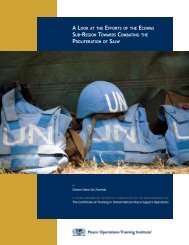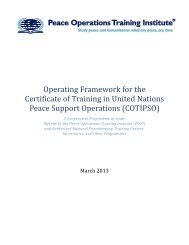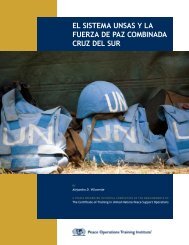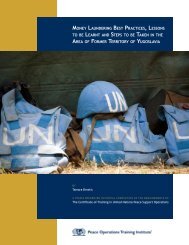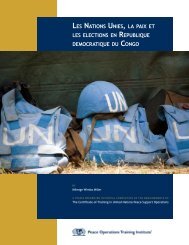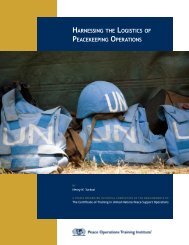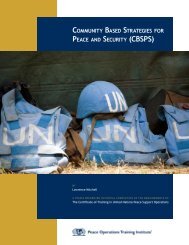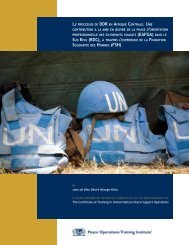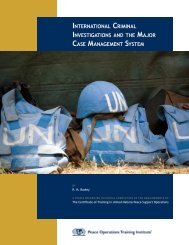the rise and rise of private military companies - Peace Operations ...
the rise and rise of private military companies - Peace Operations ...
the rise and rise of private military companies - Peace Operations ...
Create successful ePaper yourself
Turn your PDF publications into a flip-book with our unique Google optimized e-Paper software.
Hyder GulamThe fundamental basis <strong>of</strong> <strong>the</strong> Additional Protocol is that all six requirements listed insubparagraphs 2(a) to 2(f) must be satisfied for <strong>the</strong> definition to be met. A failure tosatisfy one requirement is sufficient to prevent <strong>the</strong> definition being met. O<strong>the</strong>rsignificant limitations contained within <strong>the</strong> Additional Protocol include:The lack <strong>of</strong> a generally acceptable <strong>and</strong> operational definition <strong>of</strong> <strong>the</strong> concept <strong>of</strong>mercenaries for application within modern warfare;The narrow focus on <strong>the</strong> status <strong>of</strong> <strong>the</strong> individual conducting an action, as opposed to awider focus on <strong>the</strong> act <strong>of</strong> direct intervention in armed conflict as a combatant; <strong>and</strong>The lack <strong>of</strong> any fundamental differentiation between PMC conducting <strong>military</strong>-styleoperations <strong>and</strong> traditional freelance style mercenaries.It seems that <strong>the</strong> only purpose <strong>of</strong> <strong>the</strong> Article 47 definition is to deny such mercenaries<strong>the</strong> right to claim combatant <strong>and</strong> PW status in <strong>the</strong> event <strong>of</strong> capture, a status which iso<strong>the</strong>rwise presumed under Article 45 <strong>of</strong> Protocol I. State parties may never<strong>the</strong>lesschoose to accord mercenaries in <strong>the</strong>ir custody PW treatment <strong>and</strong> are bound byminimal guarantees <strong>of</strong> humane treatment. In principle, however, Article 47 deniesmercenaries <strong>the</strong> right to claim combatant status. They can consequently be tried ascommon criminals by <strong>the</strong> relevant state party, provided <strong>the</strong> acts committed arecriminalised under national legislation. They may even be tried for being mercenaries,but only if <strong>the</strong>re is domestic legislation criminalizing <strong>the</strong> status <strong>of</strong> being a mercenary,which would be unusual. 29For completeness, it should be noted that Additional Protocol II relating to <strong>the</strong>protection <strong>of</strong> victims <strong>of</strong> non-international armed conflicts made no mention <strong>of</strong>mercenaries, nor PMCs. 30Organisation <strong>of</strong> African Unity 31The mercenary activity <strong>of</strong> <strong>the</strong> 1960s led to a backlash by African leaders who saw itas threatening <strong>the</strong>ir countries’ right to self-determination <strong>and</strong> new-found sovereignty.Since <strong>the</strong> UN passed its first resolution condemning <strong>the</strong> use <strong>of</strong> mercenaries in 1968, ithas repeatedly condemned mercenary activity as an internationally unlawful act whichserves to undermine <strong>the</strong> exercise <strong>of</strong> <strong>the</strong> right to self-determination <strong>of</strong> peoples <strong>and</strong> <strong>the</strong>enjoyment <strong>of</strong> human rights. 32The Organization <strong>of</strong> African Unity (OAU) established <strong>the</strong> Convention for <strong>the</strong>Elimination <strong>of</strong> Mercenarism in Africa. Article 1 <strong>of</strong> <strong>the</strong> Convention identifiedmercenaries directly by referring to <strong>the</strong> purpose <strong>of</strong> <strong>the</strong>ir employment, specifically if<strong>the</strong>y were hired for <strong>the</strong> overthrow <strong>of</strong> governments or OAU-recognized liberationmovements. A mercenary was anyone who is not a national <strong>of</strong> <strong>the</strong> state against whichhis actions are directed, is employed, enrols or links himself willingly to a person,group or organisation whose aim is:(a) to overthrow by force <strong>of</strong> arms or by any o<strong>the</strong>r means, <strong>the</strong> government <strong>of</strong> thatMember State <strong>of</strong> <strong>the</strong> Organisation <strong>of</strong> African Unity;29 Op cit, fn.15, p.28.30 ibid p.27.31 OAU was replaced by African Union on 9 July 2002 - http://www.mbendi.co.za/oroau.htm32 Op cit, fn.17, p.9.Page 11The <strong>rise</strong> <strong>and</strong> <strong>rise</strong> <strong>of</strong> Private Military Companies




